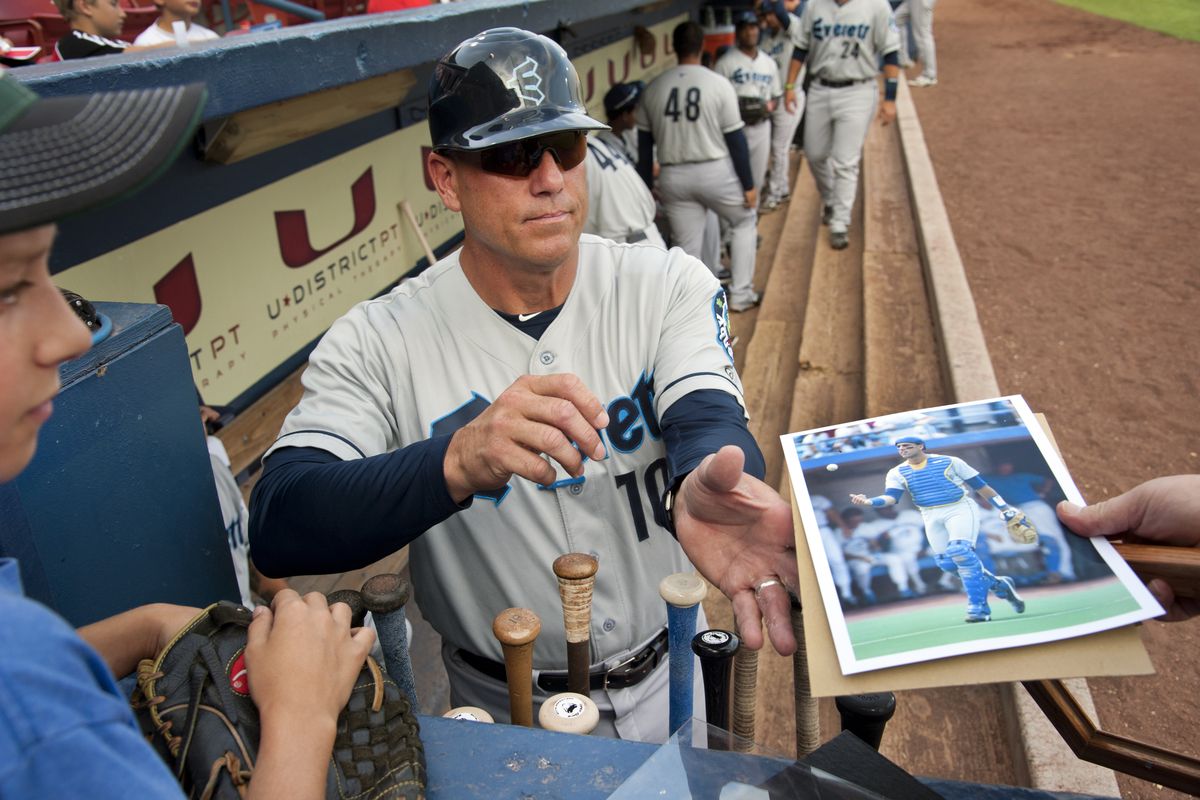John Blanchette: Dave Valle back in the dugout, with an eye in managing in majors

Fresh into Spokane and just off the bus, Dave Valle sought an updated scouting report.
“Is Dick’s Hamburgers still here?” he wondered.
Does Starbucks peddle overpriced mud?
“First time I had a Dick’s hamburger was with Jamie Allen, the flash from Yakima,” Valle said. “He knew all about those late-night burgers.”
The year was 1982 – Spokane’s last year in Triple-A baseball and Dave Valle’s first as a promising young catcher in the Seattle Mariners chain. Then, as now, he entered through the visitors’ clubhouse.
“Looking around this locker room,” he said, “I don’t think anything’s changed.”
Other than a coat of paint and his own career arc.
Dave Valle’s been an invited guest in your living room or car for roughly 30 years – 13 as a major league catcher with the M’s, Red Sox and Rangers, and the last 17 doing in-game color, postgame analysis, pregame shtick and just about everything on Mariners broadcasts except lacquering Brad Adam’s hair.
This weekend, he’s making his house call in person.
He’s the rookie manager for the Everett AquaSox, the Mariners’ Northwest League appendage – who, alas, are not having what the big club is having this season. The AquaSox fell to 10-26 after a 12-3 drubbing by Spokane on Saturday night.
Searching to change the mojo or find a spark, Valle has tried the arm around the shoulder and the kick in the pants, and even got himself run a couple of times. Short of solutions, he at least has sympathy – drawn from his first days as an M’s farmhand in this league.
“I was 17, came from New York City to Bellingham and went 3 for 4 my first game,” he recalled. “I’m thinking, ‘This is going to be easy.’ I think I finished that year hitting .204.”
So why get back on the bus and do it again?
For the same reason he did it the first time: to get to the big leagues.
When the Mariners were searching far and wide for a new big league manager last fall before settling on Lloyd McClendon, Valle actually got an interview. He wouldn’t have been the first to go from broadcast booth to making out the lineup card, but he also knew he was a long shot.
“But then they came back and asked what I thought about checking the box and getting some experience in Everett?” he said.
If this seems a little like interviewing to become CEO and getting a job in the mailroom, Valle couldn’t have been more jazzed. He could commute the half hour to the ballpark. He could still do his broadcasting gig at either end of the 10-week NWL season. And as an empty-nester, he wouldn’t be reneging on a pledge to his kids not to be an absentee baseball dad.
“It’s been great to be able to share some of what others taught me,” he said. “It’s fun to see the light go on when they get it.”
And then there are the times he has to flick the switch.
“The other night we’re winning 2-0 and there’s a 2-2 count,” Valle said. “Our pitcher decides to throw a curveball. It misses and he walks the guy, and the next guy hits a home run and we’re tied.
“After the inning, I’m talking to both my pitcher and catcher and ask, ‘OK, what was the turning point of that inning?’ I don’t have a problem throwing a curveball 2-2 – I don’t care for it much when we’re winning – but would you throw it 3-2? No. So then step a pitch back and ask, ‘Why a 2-2 curve?’ Because now if you don’t throw a strike, you’re putting the tying run at the plate. If the first guy hits a 2-2 fastball over the wall, we’re still winning 2-1. The walks … it’s amazing how often they come around to score.”
Baseball is a voracious monster of such micro dilemmas and demands. But while Valle can parse strategy with 20-year-olds or on TV, he is hardly consumed by it. A chance encounter with some shoeless, shirtless and hungry kids after a winter league game in the Dominican Republic nearly 30 years ago eventually led to he and his wife, Vicky, founding Esperanza, a microfinancing nonprofit that helps Dominicans and Haitians fund small startups and create their own jobs. In 20 years they’ve loaned out more than $45 million – to 180,000 borrowers. Now schools are benefiting, too, and Esperanza has helped construct 30 water purification systems.
Back in the Northwest League, he lends the wisdom of his experience and tries to help create careers, even through the bummer of a 10-26 record.
“The world can’t end when you’re 0 for 25 at the plate,” he said. “And you will be. Unless your last name is Griffey.”
Sounds like a good topic over late-night burgers. The manager knows a good spot.